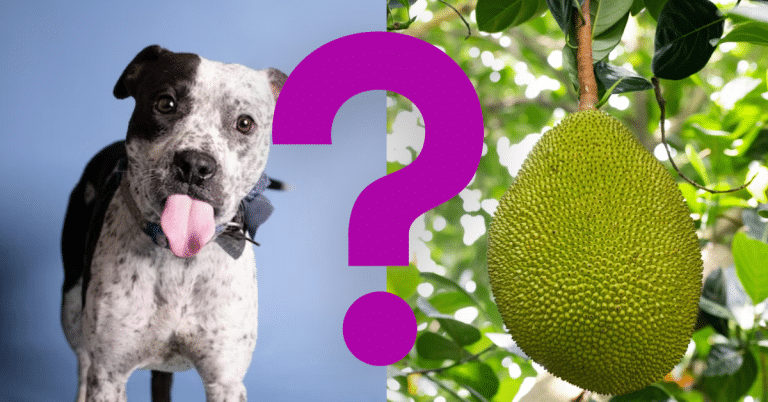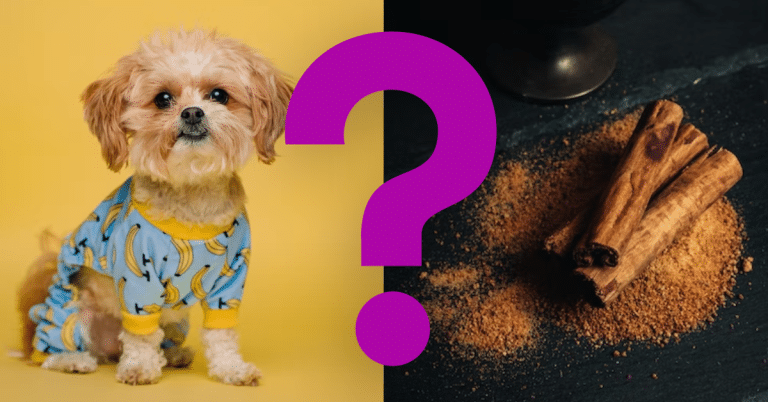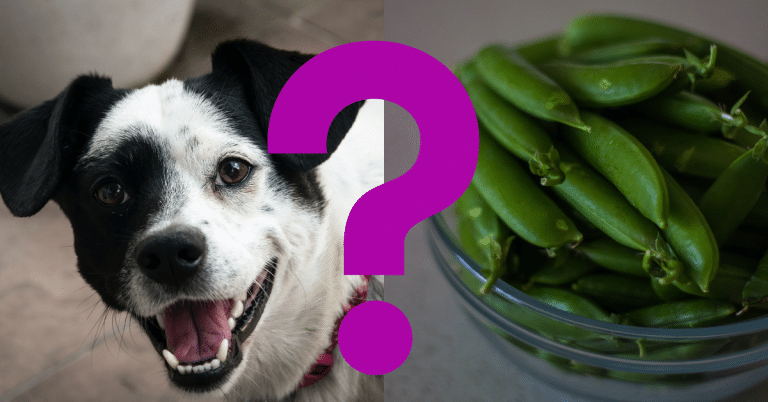Can Dogs Eat Bone Marrow? A Vet’s Opinion

The soft, fatty tissue known as bone marrow, located inside the cavities of bones, is in charge of making blood cells and storing fat. But can you feed bone marrow to your dog?
Yes, when consumed in moderation, bone marrow is safe for dogs. For them, it’s a delightful and nourishing treat. Healthy fats and nutrients, including vitamins and minerals, are abundant in the marrow, which is good for your dog’s health. To prevent weight gain or digestive problems, it should only be provided as a special treat sometimes rather than as a primary source of nutrition. Always ensure the marrow bone is raw or cooked without seasonings to avoid choking risks. Also, always keep an eye on your dog while they are eating it. For detailed dietary advice for your dog, speak with your veterinarian.
Benefits of bone marrow for dogs
Dogs can gain from bone marrow in several ways:
- Rich In Nutrients: Vitamins A and K, minerals like iron, zinc, phosphorus, and good fats are abundant in bone marrow. These nutrients aid the overall health of your dog.
- Joint Health: Bone marrow is particularly advantageous for older dogs or those prone to joint problems since it contains glucosamine and chondroitin, which can help maintain healthy joints and prevent arthritis.
- Digestive Health: Healthy fats in the marrow can help a dog’s digestive tract, enhancing nutrient absorption and lowering the risk of gastrointestinal issues.
- Dental Hygiene: Chewing on bone marrow will keep your dog’s teeth clean by reducing plaque and tartar accumulation, which could result in better oral hygiene.
- Mental Stimulation: Chewing on marrow bones helps stimulate the mind and quell boredom, which lowers the risk of engaging in harmful behavior.
- Weight Management: Bone marrow is a tasty treat with many calories that can help you lose weight by moderately sating your dog’s hunger.
- Shinier Coat: The lipids and vitamins in bone marrow may help your dog’s coat look glossier and feel healthier.
Despite the many advantages, bone marrow should only be consumed occasionally and in the proper form (raw or cooked without seasonings). To be sure it’s suited for your dog’s needs and to establish proper serving quantities, speak with your veterinarian. When giving your dog marrow bones, always keep an eye on them to avoid choking or splinter risks.
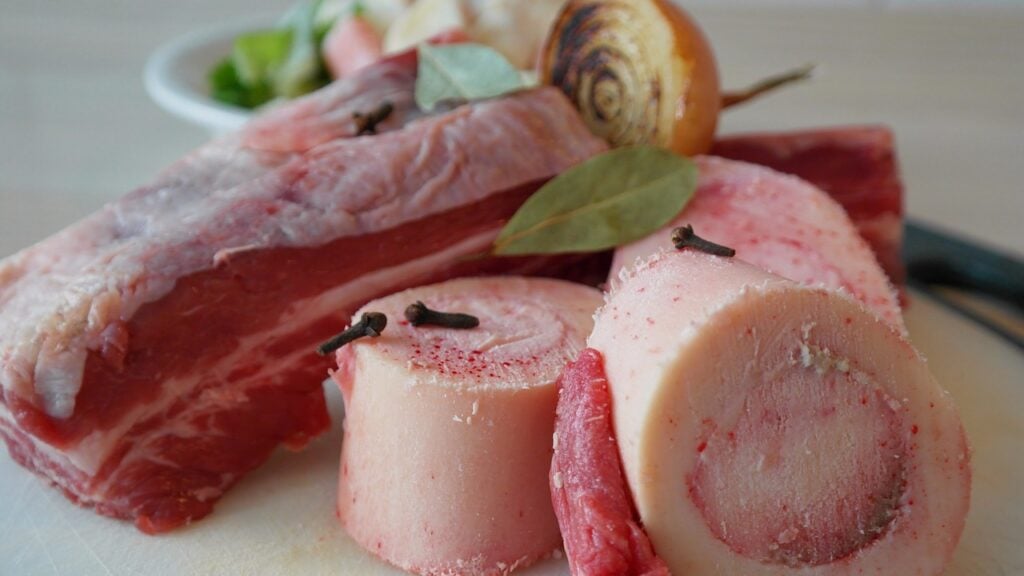
How to safely give bone marrow to dogs
A few crucial procedures must be taken to safely give your dog bone marrow to protect their health and reduce any dangers. Here is a thorough instruction on how to accomplish it:
- Pick The Right Bone: Choose a bone that has a lot of marrow in it. These are often huge, strong bones from cows or bison that can endure gnawing. Avoid using small or poultry-derived bones since they might splinter and present a choking hazard.
- Raw Or Cooked: Whether raw or cooked, you can feed bone marrow to your dog. Many people like to serve it raw because cooking can make bones brittle and possibly shatter. If you decide to cook it, a safer approach is to slowly roast it in the oven until the marrow softens and can be quickly scooped out.
- Trim Extra Flesh: Trim any extra flesh or tissue off the bone to expose the marrow only. Doing this can stop your dog from overindulging in fat or protein, which could disturb their digestive system.
- Supervision: Always keep an eye on your dog when they are eating a bone with marrow. It prevents them from accidentally ingesting huge fragments of bone, which may be harmful. If the bone splinters or shrinks to the point where it can be swallowed, remove it.
- Limit Access: Give your dog the bone to chew on only some of the time. To avoid overindulgence, it is recommended to provide it as a rare treat. When your dog has finished devouring the marrow, store the bone in the freezer to preserve its freshness.
- Gradually Introduce: If your dog has never eaten bone marrow, do it gradually and watch their reaction. Watching for adverse reactions like vomiting or diarrhea is essential because some dogs may have allergies or sensitivities.
- Serving Size: Depending on your dog’s size and breed, the size of the bone and the amount of marrow it consumes should be adequate. Small or toy-breed dogs should have lesser amounts, whereas larger dogs can tolerate larger bones.
- Dental Hygiene: Bone marrow can assist with teeth cleaning for your dog, but it should take something other than routine dental care. Continue brushing or giving dental chews to your dog as part of his dental routine.
- Alternatives: Commercial marrow treats, specially made to lower the chance of splintering, are safer options if you’re worried about the risks linked with bone marrow.
- Consult Your Veterinarian: Speak with your veterinarian before introducing bone marrow to your dog’s diet. They can offer advice depending on your dog’s particular requirements, such as any dietary restrictions or allergies.
To ensure that your dog eats a balanced diet, remember that bone marrow should only be given as a special treat occasionally. You can give your dog a tasty and nourishing treat by adhering to these rules and paying great attention to their security and well-being.
Will bone marrow make a dog sick?
When cooked carefully and in moderation, bone marrow is generally well-tolerated by dogs. However, giving bone marrow to dogs carries several possible dangers and health risks. The following illnesses or problems may develop if the bone marrow is not administered correctly:
- Gastrointestinal Distress: Dogs with sensitive stomachs or consuming too much bone marrow at once may experience diarrhea, vomiting, or other gastrointestinal distress.
- Choking Risk: If consumed, tiny bone pieces or splinters can cause choking. To avoid choking problems, always keep an eye on your dog while they are enjoying bone marrow.
- Pancreatitis: Marrow contains a lot of fat, and too much of it can cause pancreatitis in some dogs, especially those with a history of it.
- Obesity: Feeding excessive amounts of marrow regularly can contribute to weight gain and obesity, leading to various health problems over time.
- Allergic Reactions: Specific proteins in bone marrow may cause allergies or sensitivities in some dogs, resulting in allergic reactions such as itching, skin rashes, or gastrointestinal discomfort.
- Constipation: The high-fat marrow content may cause constipation in particular dogs, mainly if they consume significant amounts of it.
- Blockages: Swallowing large chunks of bone, especially if sharp or jagged, can result in severe and potentially fatal intestinal blockages.
- Dental Problems: While chewing on bones can help clean teeth, it can also cause dental problems if your dog chews too aggressively and breaks their teeth.
To reduce the danger of these potential complications, moderate your dog’s bone marrow and select appropriate-sized bones. Additionally, before introducing bone marrow into your dog’s diet, contact your veterinarian, especially if your dog has any pre-existing health concerns or dietary restrictions. Always keep an eye on your dog while they’re eating marrow bones, and if you detect any adverse reactions or symptoms of disease, contact your veterinarian immediately.
Can Dogs Eat Bone Marrow Variations?
Dogs can successfully consume bone marrow from various sources, but verifying that the variations are safe and adequately prepared is critical. Here are some things to think about:
Dogs can consume bone marrow from various species, including cattle, bison, lamb, and hog. Always get bone marrow from a reliable supplier free of additives, flavors, and dangerous compounds.
- Raw Or Cooked: Dogs may eat both raw and cooked bone marrow. Many dog owners, however, prefer to serve it raw because boiling can cause bones to become brittle and perhaps splinter, posing a choking or injury danger. Slow-roasting bone marrow is a safer way to keep it tender and safe if you cook it.
- Bone Size: Select bones based on your dog’s size and chewing skill. Larger dogs can manage larger bones. However, smaller dogs need fewer parts to avoid choking dangers.
- Supervision: It is always required when your dog consumes bone marrow, whether raw or cooked. It prevents them from swallowing huge bone fragments or splinters.
- Trim Excess Tissue: Remove any excess meat or tissue before giving your dog a bone. It keeps dogs from overeating fat or protein, which might cause intestinal distress.
- Bone marrow should be provided as a treat only, not as a primary source of nutrition. Moderate consumption prevents overindulgence and related health problems such as obesity or pancreatitis.
- Allergies: Some dogs may have allergies or sensitivities to specific animal proteins, so after introducing a new kind of bone marrow, monitor your dog for any allergic symptoms, such as itching or gastrointestinal trouble.
- Consult Your Vet: Before introducing bone marrow variations to your dog’s diet, particularly if you’re considering introducing a new type of marrow, check with your veterinarian. They can advise based on your dog’s needs and dietary preferences.
In conclusion, dogs can safely consume bone marrow variations if safeguards are taken, appropriate sources are used, and it is fed in moderation. Always put your dog’s safety and well-being first, and visit your veterinarian if you have any concerns or questions about their nutrition.
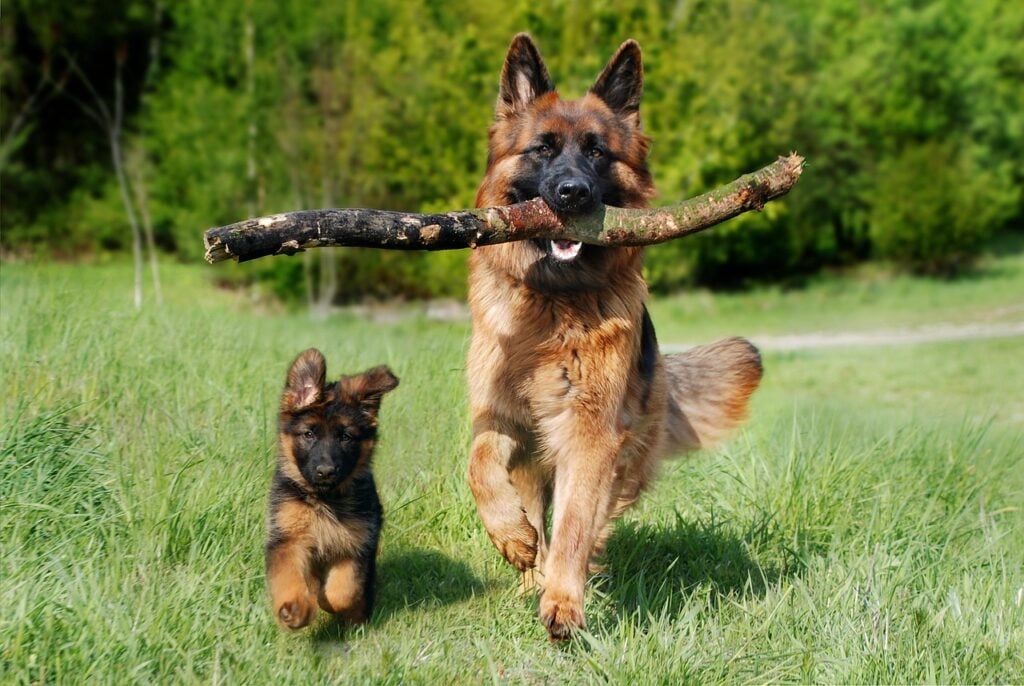
Vet’s Summary
When done appropriately, the article emphasizes the safety and benefits of giving bone marrow to dogs. Bone marrow is a nutrient-dense treatment with various benefits, including joint support, enhanced dental health, and critical vitamins and minerals. To avoid potential dangers such as choking, gastrointestinal discomfort, or excessive weight gain, it’s critical to choose the proper bone, observe your dog during intake, and offer it in moderation.
In any event, dog owners should consider adding probiotic supplements to their pets’ meals. Probiotics can help with digestion, nutrient absorption, and general gastrointestinal health by promoting a healthy gut microbiota. Given that bone marrow, while nutritious, can occasionally cause digestive troubles, probiotics can add an added layer of protection to your dog’s health. Please consult your veterinarian to select the best probiotic supplement for your dog’s needs and ensure it effectively complements their diet and lifestyle.
Videos to watch
If you are wondering what related foods are good to give your dog, watch this:
And if you want to know what a dog can NOT eat, watch this:



